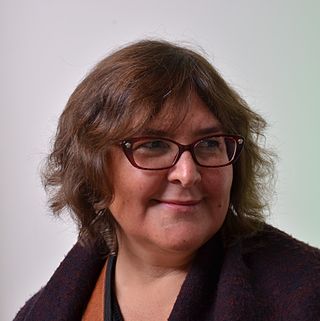
In academic publishing, a preprint is a version of a scholarly or scientific paper that precedes formal peer review and publication in a peer-reviewed scholarly or scientific journal. The preprint may be available, often as a non-typeset version available free, before or after a paper is published in a journal.
Word of mouth, also called viva voce, is the passing of information from person to person using oral communication, which could be as simple as telling someone the time of day. Storytelling is a common form of word-of-mouth communication where one person tells others a story about a real event or something made up. Oral tradition is cultural material and traditions transmitted by word of mouth through successive generations. Storytelling and oral tradition are forms of word of mouth that play important roles in folklore and mythology. Another example of oral communication is oral history—the recording, preservation and interpretation of historical information, based on the personal experiences and opinions of the speaker. Oral history preservation is the field that deals with the care and upkeep of oral history materials collected by word of mouth, whatever format they may be in.

Academic publishing is the subfield of publishing which distributes academic research and scholarship. Most academic work is published in academic journal articles, books or theses. The part of academic written output that is not formally published but merely printed up or posted on the Internet is often called "grey literature". Most scientific and scholarly journals, and many academic and scholarly books, though not all, are based on some form of peer review or editorial refereeing to qualify texts for publication. Peer review quality and selectivity standards vary greatly from journal to journal, publisher to publisher, and field to field.

An academic journal or scholarly journal is a periodical publication in which scholarship relating to a particular academic discipline is published. Academic journals serve as permanent and transparent forums for the presentation, scrutiny, and discussion of research. They nearly universally require peer review or other scrutiny from contemporaries competent and established in their respective fields. Content typically takes the form of articles presenting original research, review articles, or book reviews. The purpose of an academic journal, according to Henry Oldenburg, is to give researchers a venue to "impart their knowledge to one another, and contribute what they can to the Grand design of improving natural knowledge, and perfecting all Philosophical Arts, and Sciences."

Open access (OA) is a set of principles and a range of practices through which research outputs are distributed online, free of access charges or other barriers. Under some models of open access publishing, barriers to copying or reuse are also reduced or removed by applying an open license for copyright.

Shivaji University, established in 1962, is a state university located at Kolhapur, Maharashtra, India. The university, with a campus spread over 853 acres (345 ha), is named after Chhatrapati Shivaji Maharaj, founder of the Maratha Empire. It was inaugurated on 18 November 1962 by Sarvepalli Radhakrishnan, the then president of India. Yashwantrao Chavan and Balasaheb Desai took the lead in establishing this university. One of the major objectives behind its foundation was to cater to the educational needs of South Maharashtra region. The University's efforts towards excellence are being recognised by the substantial grants received from funding agencies such as University Grants Commission (India), Department of Science and Technology (India).
The American Council of Learned Societies (ACLS) is a private, nonprofit federation of 75 scholarly organizations in the humanities and related social sciences founded in 1919. It is best known for its fellowship competitions which provide a range of opportunities for scholars in the humanities and related social sciences at all career stages, from graduate students to distinguished professors to independent scholars, working with a number of disciplines and methodologies in the U.S. and abroad.
An online database is a database accessible from a local network or the Internet, as opposed to one that is stored locally on an individual computer or its attached storage. Online databases are hosted on websites, made available as software as a service products accessible via a web browser. They may be free or require payment, such as by a monthly subscription. Some have enhanced features such as collaborative editing and email notification.

Michael Strangelove is a Canadian writer and academic, currently a lecturer in the Department of Communication at the University of Ottawa. His two most notable works include Watching YouTube: Extraordinary Videos by Ordinary People and The Empire of Mind: Digital Piracy and the Anti-Capitalist Movement, which was nominated for a Governor General's Award for English non-fiction in 2006.

Electronics Letters is a peer-reviewed scientific journal published biweekly by the Institution of Engineering and Technology. It specializes in the rapid publication of short communications on all areas of electronic engineering, including optical, communication, and biomedical engineering, as well as electronic circuits and signal processing.
Ecquid Novi: African Journalism Studies is a masked peer-reviewed academic journal for journalism research in Africa.
Scholarly communication involves the creation, publication, dissemination and discovery of academic research, primarily in peer-reviewed journals and books. It is “the system through which research and other scholarly writings are created, evaluated for quality, disseminated to the scholarly community, and preserved for future use." This primarily involves the publication of peer-reviewed academic journals, books and conference papers.

African Journals OnLine (AJOL) is a South African non-profit organisation, which is in the headquarters of Grahamstown, it is dedicated to improve the online visibility and access to the published scholarly research of African-based academics. By using the internet as a gateway, AJOL aims to enhance conditions for African learning as well as African development.

Mass media in Kenya includes more than 91 FM stations, more than 64 free to view TV stations, and an unconfirmed number of print newspapers and magazines. Publications mainly use English as their primary language of communication, with some media houses employing Swahili. Vernacular or community-based languages are commonly used in broadcast media; mostly radio.
The mass media in Senegal is varied and includes multiple television channels, numerous private radio stations, and over 15 newspapers.
Communication Education is a peer-reviewed publication of the National Communication Association published by Taylor & Francis. Communication Education publishes original scholarships that advance understanding of the role of communication in the teaching and learning process in diverse spaces, structures, and interactions, within and outside of academia. Communication Education welcomes scholarships from diverse perspectives and methodologies, including quantitative, qualitative, and critical/textual approaches. All submissions must be methodologically rigorous and theoretically grounded and geared toward advancing knowledge production in communication, teaching, and learning.

The South African Army Signal Formation is a formation/corps of the South African Army.

Anriette Esterhuysen is a human rights defender and computer networking pioneer from South Africa. She has pioneered the use of Internet and Communications Technologies (ICTs) to promote social justice in South Africa and throughout the world, focusing on affordable Internet access. She was the Executive Director of the Association for Progressive Communications from 2000 until April 2017, when she became APC's Director of Policy and Strategy. In November 2019 United Nations Secretary-General António Guterres appointed Esterhuysen to Chair the Internet Governance Forum’s Multistakeholder Advisory Group.
Open access to scholarly communication in South Africa occurs online via journals, repositories, and a variety of other tools and platforms. Compared to other African nations, open access in South Africa has grown quickly in recent years.










